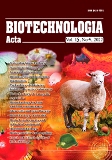ISSN 2410-7751 (Print)
ISSN 2410-776X (Online)

Biotechnologia Acta Т. 15, No. 4, 2022
P. 47-49. Bibliography 7, Engl.
UDC: 604.2:615.076.9:571.27
https://doi.org/10.15407/biotech15.04.047
EFFECTS OF B. Subtilis IMV В-7724 LECTIN ON MALIGNANT AND NORMAL CELLS in vitro
T.V. Symchych, N.I. Fedosova, A.V. Chumak, N.L. Cheremshenko, O.M. Karaman
Kavetsky Institute of Experimental Pathology, Oncology and Radiobiology of the National Academy of Sciences of Ukraine, Kyiv
Cancer cells upregulate surface expression of N-glycolyl-neuraminic acid (Neu5Gc). At Kavetsky Institute of Experimental Pathology, Oncology and Radiobiology (IEPOR) of the National Academy of Science of Ukraine, B. subtilis IMV В-7724 lectin specific for Neu5Gc was obtained.
Aim. The scope of the research was to study in vitro B. subtilis IMV В-7724 lectin activity towards malignant and normal cells.
Materials and methods. Cytotoxic and mitogenic activities was studied by, respectively, MTT-assay and in vitro lymphocytes proliferation assay.
Results. The lectin possesses cytotoxic activity towards human (А549, HL60) and murine (Ehrlich carcinoma, L1210) cancer cell lines. The most sensitive were L1210 and Ehrlich carcinoma cell lines. IC50 was 0.16 mg/ml in both cases. The lectin was less cytotoxic to murine peritoneal macrophages, lymphocytes and thymocytes: IC50 was 0.47, 2.02 and 3.49 mg/ml respectively. In a dose of 25 µg/ml the lectin induced lymphocytes proliferation.
Conclusion. Depending on the target cells type and applied dose, B. subtilis IMV B-7724 lectin shows cytotoxic or mitogenic activities. Both of lectin’s activities can be applied in cancer treatment and thus deserve further investigation
Key words: B. subtilis IMV B-7724 lectin, cytotoxic activity, mitogenic activity
© Palladin Institute of Biochemistry of the National Academy of Sciences of Ukraine, 2022
References
1. Boligan K. F., Mesa C., Fernandez L. E., von Gunten S. Cancer intelligence acquired (CIA): tumor glycosylation and sialylation codes dismantling antitumor defense. Cell. Mol. Life Sci. 2015, 72 (7), 1231–1248. https://doi.org/10.1007/s00018-014-1799-5
2. Gupta A. Emerging applications of lectins in cancer detection and biomedicine. Materials Today: Proceedings. 2020, 31 (2), 651–661.https://doi.org/10.1016/j.matpr.2020.05.810
3. Fedosova N. I., Cheremshenko N. L., Hetman K. I., Symchyc T. V., Chumak A. V., Shliahovenko V. O., Voyeykova I. M., Didenko G. V. Physicochemical and cytotoxicity properties of Bacillus subtilis ІМV В-7724 extracellular lectin. Mikrobiol Z. 2021, 83, 39–48. https://doi.org/10.15407/microbiolj83.01.039
4. Podgorsky V. S., Kovalenko E. A., Karpova I. S., Sashchuk E. V., Get'man E. I. [Extracellular lectins of saprophytic strains of bacteria of the genus Bacillus (review)]. Prikl. Biokhim. Mikrobiol. 2014, 50 (3), 256–263. (In Russian). https://doi.org/10.7868/S0555109914030283
5. Van de Loosdrecht A. A., Beelen R. H , Ossenkoppele G. J., Broekhoven M. G., Langenhuijsen M. M. A tetrazolium-based colorimetric MTT assay to quantitate human monocyte mediated cytotoxicity against leukemic cells from cell lines and patients with acute myeloid leukemia. J. Immunol. Methods. 1994, 174 (1-2), 311–320. https://doi.org/10.1016/0022-1759(94)90034-5
6. Varki A. Loss of N-glycolylneuraminic acid in humans: mechanisms, consequences, and implications for hominid evolution. Am. J. Phys. Anthropol, Suppl. 2001, 33, 54–69. https://doi.org/10.1002/ajpa.10018.abs
7. Banda K., Gregg C.J., Chow R., Varki N.M., Varki A. 2012. Metabolism of vertebrate amino sugars with N-glycolyl groups: mechanisms underlying gastrointestinal incorporation of the non-human sialic acid xeno-autoantigen N-glycolylneuraminic acid. J. Biol. Chem. 2012, 287, 28852–28864. https://doi.org/10.1074/jbc.M112.364182
8. Bardor M., Nguyen D.H., Diaz S., Varki A. 2005. Mechanism of uptake and incorporation of the non-human sialic acid N-glycolylneuraminic acid into human cells. J. Biol. Chem. 2005, 280, 4228–4237. https://doi.org/10.1074/jbc.M412040200
9. Malykh Y.N., Schauer R., Shaw L. N-Glycolylneuraminic acid in human tumours. Biochimie. 2001, 83 (7), 623–634. https://doi.org/10.1016/S0300-9084(01)01303-7

